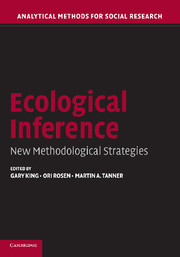Information in Ecological Inference: An Introduction
Published online by Cambridge University Press: 18 May 2010
Summary
Researchers in a diverse variety of fields often need to know about individual-level behavior and are not able to collect it directly. In these situations, where survey research or other means of individual-level data collection are infeasible, ecological inference is the best and often the only hope of making progress. Ecological inference is the process of extracting clues about individual behavior from information reported at the group or aggregate level.
For example, sociologists and historians try to learn who voted for the Nazi party in Weimar Germany, where thoughts of survey research are seven decades too late. Marketing researchers study the effects of advertising on the purchasing behavior of individuals, where only zip-code-level purchasing and demographic information are available. Political scientists and politicians study precinct-level electoral data and U.S. Census demographic data to learn about the success of candidate appeals with different voter groups in numerous small areal units where surveys have been infeasible (for cost or confidentiality reasons). To determine whether the U.S. Voting Rights Act can be applied in redistricting cases, expert witnesses, attorneys, judges, and government officials must infer whether African Americans and other minority groups vote differently from whites, even though the secret ballot hinders the process and surveys in racially polarized contexts are known to be of little value.
- Type
- Chapter
- Information
- Ecological InferenceNew Methodological Strategies, pp. 1 - 12Publisher: Cambridge University PressPrint publication year: 2004
- 11
- Cited by

